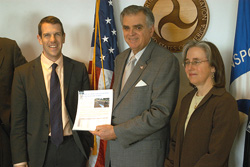Protecting Vulnerable Roadway Users
On August 18, the Seattle Times reported, that the state Court of Appeals rejected a Seattle ordinance that criminalized traffic violations when someone is seriously hurt or killed. On the following day, KOMO news reported, "Cyclists on crash course to set deadly record . . . twice as many fatalities as all of 2008." Four bicyclists had already died in Seattle this year.
While pedestrians and bicycles sometimes share a rather wary alliance, our unity comes from a shared vulnerability to the speed and mass associated with motorized travel.
Jointly, we also are tired of hearing about terrible “accidents” where a motorist kills or grievously injures a vulnerable roadway user by failing to drive in a safe and lawful manner with the only consequence for the motorist being a traffic ticket that doesn’t even require a court appearance and includes no license suspension or driver retraining.
Advocates and community members are shocked after a serious collision injures or kills a bicyclist when they discover that the driver who caused the crash will be prosecuted only for a traffic violation. When this happens, a motorist may pay a base-fine of as little as $42, receive no license suspension, and resolve the matter by sending a check to the court by mail.
It is these problems coupled with several high visibility fatalities in Washington in the last several years, in which the driver was cited merely for Failure to Yield, that have highlighted our urgency to change the law.
The need for reform is the result of the fact that law enforcement officers and prosecutors have few options under Washington law to charge negligent driving resulting in serious injuries or death. The state law on the books that determines a crime for negligent driving is when it causes a death and the driver:
“(1) When the death of any person ensues within three years as a proximate result of injury proximately caused by the driving of any vehicle by any person, the driver is guilty of vehicular homicide if the driver was operating a motor vehicle:
(a) While under the influence of intoxicating liquor or any drug, as defined by RCW 46.61.502; or
(b) In a reckless manner; or
(c) With disregard for the safety of others.
Vehicular Homicide, RCW 46.61.250
This crime (“Vehicular Homicide” or RCW 46.61.250) is a Class A felony with a maximum sentence of “life imprisonment.” The statutory requirement for “reckless” is “Any person who drives any vehicle in willful or wanton disregard for the safety of persons or property” and is sufficiently harder to prove than “regular negligence.” As it requires proof of deliberate intent, the additional requirement of a “wanton or willful” creates a difficult burden for a prosecutor in most cases that involve dangerous driving such as speeding, failing to yield right of way, turning into the path of a bicyclist, or being distracted by a cell phone conversation. If prosecutors do not feel that they can sustain a conviction for careless or negligent driving, then there is little chance that the prosecution will be initiated.
Because the present standard requires the level of poor driving substantially above “mere negligence,” the few prosecutions that do occur usually include some sort of gross deviation from the standard of care like driving under the influence of alcohol or drugs.
There is also the view among some in law enforcement that because bicyclists and pedestrians are more vulnerable, it is foreseeable that there will be the occasional severe injuries and fatalities. It’s seen as the inevitable tradeoff between safety and the easy mobility of the auto.
Washington needs a new law making it illegal to cause serious bodily injury or death to vulnerable roadway users due to ordinary negligence. Ordinary negligence should be defined as committing a traffic infraction that endangers life and property. Prosecutors would be more likely to charge this crime if it was easier to prove and less serious than the present crimes of Vehicular Assault or Vehicular Homicide.
In addition, law enforcement would be more likely to recommend criminal prosecution for if a new status of crime victims was more widely recognized that would include bicyclists and other roadway users who are more vulnerable to being injured by negligent driving than persons encased in the protective steel of motor vehicles.







